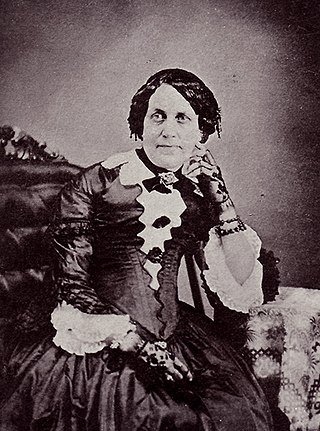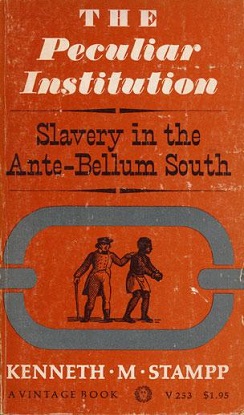
In the capitalist mode of production, wage slavery refers to the exploitation of labor by keeping wages low or stagnant in order for a business to maximize its surplus value. Wage slavery can be loosely defined as a person's dependence on wages for their livelihood, especially when wages are low, treatment and conditions are poor, and there are few chances of upward mobility.

The legal institution of human chattel slavery, comprising the enslavement primarily of Africans and African Americans, was prevalent in the United States of America from its founding in 1776 until 1865, predominantly in the South. Slavery was established throughout European colonization in the Americas. From 1526, during early colonial days, it was practiced in what became Britain's colonies, including the Thirteen Colonies that formed the United States. Under the law, an enslaved person was treated as property that could be bought, sold, or given away. Slavery lasted in about half of U.S. states until abolition. In the decades after the end of Reconstruction, many of slavery's economic and social functions were continued through segregation, sharecropping, and convict leasing.

Historians who address the origins of the American Civil War today agree that the preservation of slavery in the United States was the principal aim of the 11 Southern states that declared their secession from the United States and united to form the Confederate States of America. However, while historians in the 21st century agree on the centrality of the conflict over slavery—it was not just "a cause" of the war but "the cause" according to Civil War historian Chris Mackowski—they disagree sharply on which aspects of this conflict were most important, and on the North’s reasons for refusing to allow the Southern states to secede. Proponents of the pseudo-historical Lost Cause ideology have denied that slavery was the principal cause of the secession, a view that has been disproven by the overwhelming historical evidence against it, notably the seceding states' own secession documents.

The Lincoln–Douglas debates were a series of seven debates between Abraham Lincoln, the Republican Party candidate for the United States Senate from Illinois, and incumbent Senator Stephen Douglas, the Democratic Party candidate. Until the Seventeenth Amendment to the United States Constitution, which provides that senators shall be elected by the people of their states, was ratified in 1913, senators were elected by their respective state legislatures, so Lincoln and Douglas were trying to win the votes of the Illinois General Assembly for their respective parties.
Sectionalism is loyalty to one's own region or section of the country, rather than to the country as a whole. Sectionalism occurs in many countries, such as in the United Kingdom.

In the United States the period 1849 and 1865 was dominated by the tensions that led to the American Civil War between North and South, and the bloody fighting in 1861-1865 that produced Northern victory in the war and ended slavery. At the same time industrialization and the transportation revolution changed the economics of the Northern United States and the Western United States. Heavy immigration from Western Europe shifted the center of population further to the North.
The Black Codes, sometimes called the Black Laws, were laws which governed the conduct of African Americans. In 1832, James Kent wrote that "in most of the United States, there is a distinction in respect to political privileges, between free white persons and free colored persons of African blood; and in no part of the country do the latter, in point of fact, participate equally with the whites, in the exercise of civil and political rights." Although Black Codes existed before the Civil War and although many Northern states had them, the Southern U.S. states codified such laws in everyday practice. The best known of these laws were passed by Southern states in 1865 and 1866, after the Civil War, in order to restrict African Americans' freedom, and in order to compel them to work for either low or no wages.
Abraham Lincoln's position on slavery in the United States is one of the most discussed aspects of his life. Lincoln frequently expressed his moral opposition to slavery in public and private. "I am naturally anti-slavery. If slavery is not wrong, nothing is wrong," he stated. "I can not remember when I did not so think, and feel." However, the question of what to do about it and how to end it, given that it was so firmly embedded in the nation's constitutional framework and in the economy of much of the country, was complex and politically challenging. In addition, there was the unanswered question, which Lincoln had to deal with, of what would become of the four million slaves if liberated: how they would earn a living in a society that had almost always rejected them or looked down on their very presence.

George Fitzhugh was an American social theorist who published racial and slavery-based sociological theories in the antebellum era. He argued that the negro was "but a grown up child" needing the economic and social protections of slavery. Fitzhugh decried capitalism as practiced by the Northern United States and Great Britain as spawning "a war of the rich with the poor, and the poor with one another", rendering free blacks "far outstripped or outwitted in the chase of free competition." Slavery, he contended, ensured that blacks would be economically secure and morally civilized. Some historians consider Fitzhugh's worldview to be proto-fascist in its rejection of liberal values, defense of slavery, and perspectives toward race.

In the history of the Southern United States, the Antebellum Period spanned the end of the War of 1812 to the start of the American Civil War in 1861. The Antebellum South was characterized by the use of slavery and the culture it fostered. As the era proceeded, Southern intellectuals and leaders gradually shifted from portraying slavery as an embarrassing and temporary system, to a defense of slavery as a positive good, and harshly criticized the nascent abolitionist movement.

James Henry Hammond was an American attorney, politician, and planter. He served as a United States representative from 1835 to 1836, the 60th Governor of South Carolina from 1842 to 1844, and a United States senator from 1857 to 1860. A slave owner, he is considered one of the strongest supporters of slavery in the years before the American Civil War.

The Slave Power, or Slavocracy, referred to the perceived political power held by American slaveowners in the federal government of the United States during the Antebellum period. Antislavery campaigners, led by Frederick Douglass, during this period bitterly decried what they saw as disproportionate and corrupt influence wielded by wealthy Southerners. The argument was that this small group of wealthy enslavers had seized political control of their states and were trying to take over the federal government illegitimately to expand and protect slavery. The argument was later widely used by the Republican Party that formed in 1854–55 to oppose the expansion of slavery.
Herbert George Gutman (1928–1985) was an American professor of history at the Graduate Center of the City University of New York, where he wrote on slavery and labor history.

Proslavery is support for slavery. It is sometimes found in the thought of ancient philosophers, religious texts, and in British writings and in American writings especially before the American Civil War but also later through the 20th century. Arguments in favor of slavery include deference to the Bible and thus to God, some people being natural slaves in need of supervision, slaves often being better off than the poorest non-slaves, practical social benefit for the society as a whole, and slavery being a time-proven practice by multiple great civilizations.
Historiography examines how the past has been viewed or interpreted. Historiographic issues about the American Civil War include the name of the war, the origins or causes of the war, and President Abraham Lincoln's views and goals regarding slavery.

The Peculiar Institution: Slavery in the Ante-Bellum South is a non-fiction book about slavery published in 1956, by Kenneth M. Stampp of the University of California, Berkeley, and other universities. The book describes and analyzes multiple facets of slavery in the American South from the 17th through the mid-19th century, including demographics, lives of slaves and slaveholders, the Southern economy and labor systems, the Northern and abolitionist response, slave trading, and political issues of the time.
John H. Van Evrie (1814–1896) was a Canadian-born American physician and defender of slavery best known as the editor of the Weekly Day Book and the author of several books on race and slavery which reproduced the ideas of scientific racism for a popular audience. He was also the proprietor of the publishing company Van Evrie, Horton & Company. Van Evrie was described by the historian George M. Fredrickson as "perhaps the first professional racist in American history." His thought, which lacked significant scientific evidence even for the time, emphasized the inferiority of black people to white people, defended slavery as practiced in the United States and attacked abolitionism, while opposing class distinctions among white people and the oppression of the white working class. He repeatedly put "slave" and "slavery" in quotation marks, because he did not think these were the right words for enslaved Blacks.

The Latter Day Saint movement has had varying and conflicting teachings on slavery. Early converts were initially from the Northern United States and opposed slavery, believing that their opposition was supported by Mormon scripture. After the church base moved to the slave state of Missouri and gained Southern converts, church leaders began to own slaves. New scriptures instructing Latter-Day Saints not to intervene in the lives of the slaves of others were revealed. A few slave owners joined the church, and when they moved to Nauvoo, Illinois, they took their slaves with them, even though Illinois was a free state.
A Treatise on the Patriarchal, or Co-operative System of Society as it Exists in Some Governments and Colonies in America, and in the United States, Under the Name of Slavery, with its Necessity and Advantages, was the first major defense of slavery published in the United States. Written by Florida slave trader, planter, and Quaker Zephaniah Kingsley, it was first published under the signature “A Resident of Florida” in 1828, although Kingsley's name is found at the end of the Preface. It was reprinted three times, indicating significant readership. No other pro-slavery writing in the United States was reprinted as often.

Slavery as a positive good was the prevailing view of Southern U.S. politicians and intellectuals just before the American Civil War, as opposed to seeing it as a crime against humanity or a necessary evil. They defended the legal enslavement of people for their labor as a benevolent, paternalistic institution with social and economic benefits, an important bulwark of civilization, and a divine institution similar or superior to the free labor in the North.













